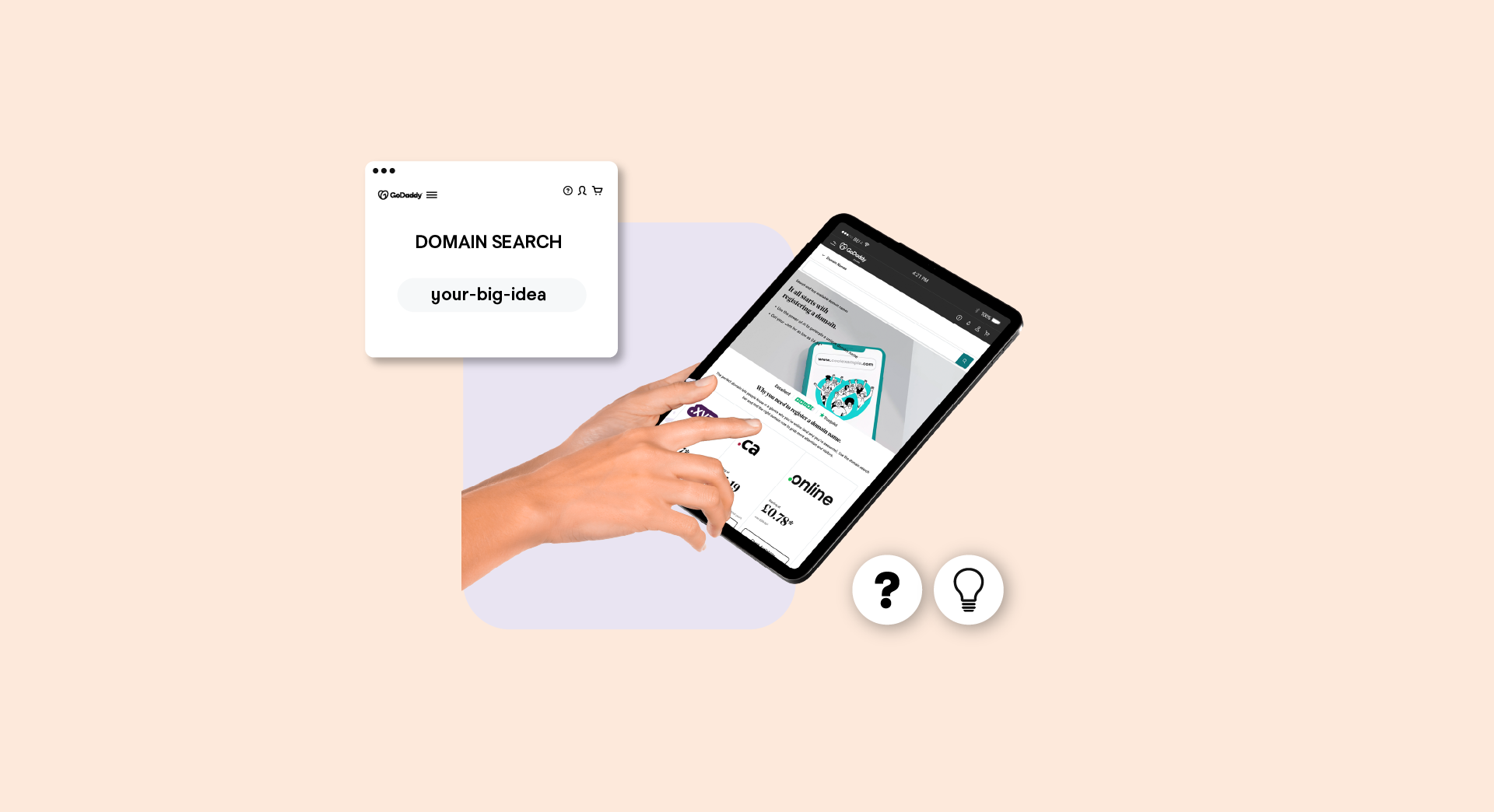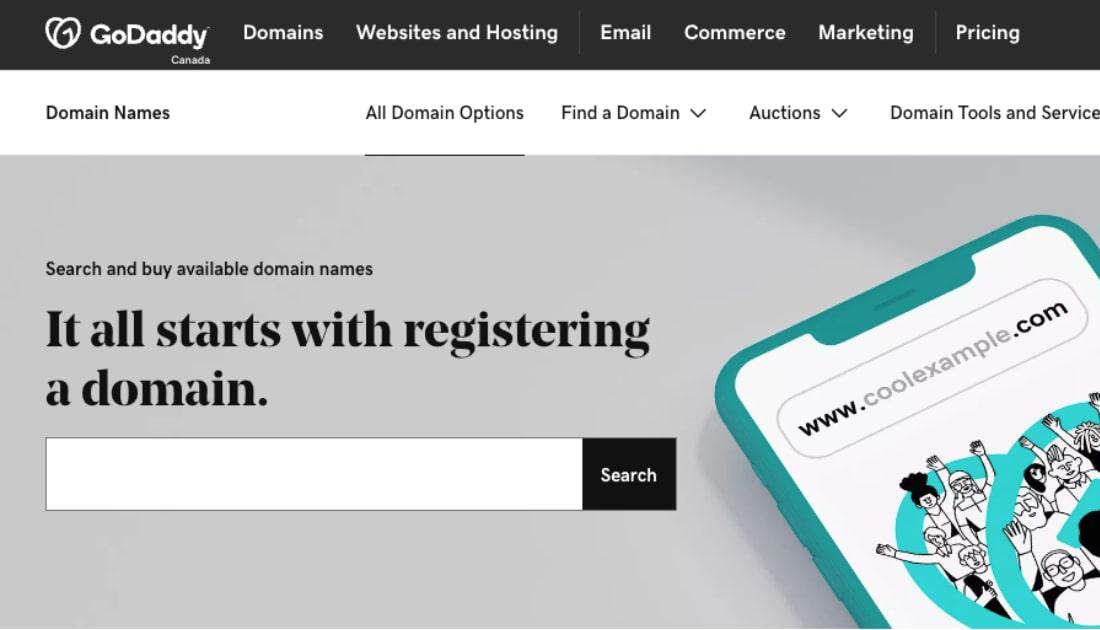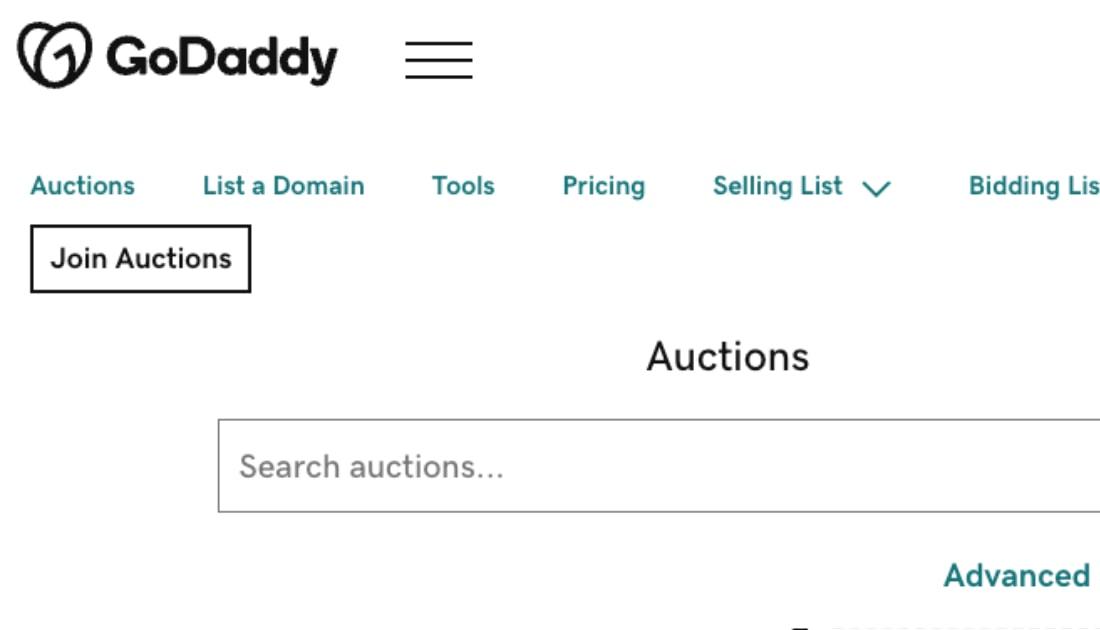What’s in a name? How important is your business name to the success of your brand — both in Canada and abroad? If you’ve got a great product but a so-so name, will quality carry the day over a lackluster moniker? In this post, I’d like to make your job easier by introducing you to the concept of domain name search.
Business names are a big deal.
There are three reasons for this. Your business name:
- Is the first thing potential customers see.
- Communicates what your business is about.
- Sets you apart from competitors.
Consider classic Canadian brand Roots. The name speaks to origins and the company has cultivated a loyal following for selling warm, well-made clothes that offer a unique take on Canadian style. The name is simple, memorable and tied to shared consumer identity.

So how do you achieve the same for your new business or rebranding? What’s the secret? While personal experience and emotional connection are essential elements, it’s not always easy to drum up brilliant ideas on demand. GoDaddy’s domain name search tool can help.
Check to see if the domain you want is available now
In search of inspiration
Where does your inspiration come from? Some companies pay experts to help brainstorm ideas and let them run creatively wild, notes Entrepreneur. This approach has led to successful company names such as Acura. While the vehicle-maker’s moniker isn’t an actual English word, it does speak to the notion of accuracy and precision, critical for any car manufacturer.
The downside of expert help? It’s not cheap, and if you don’t end up with any names you like it’s back to the drawing board.
Another option? Traditional brainstorming. Get your team together and break it down:
- What does your company do?
- What makes it stand out from the crowd?
- What do you offer consumers that other companies can’t?
Need help? Consider using an online business name generator for some extra inspiration. Just drop in keywords about your business or industry and see what comes up. Go ahead - try out our business name generator!
Improving your odds with domain name search
Before you nail down a name for your business, consider your online presence.
In a digital-first world, the image you present online is just as — if not more — important than physical, in-store branding.
Why? Because online, all you’ve got are first impressions. If you can get customers into your brick-and-mortar store, they’ll probably poke around, ask questions and make attempts to figure out your brand name and mission, even if it doesn’t make sense immediately. Try this online and users are off to the next website, hoping for a brand that makes it clear up-front exactly what’s being offered and why it deserves consumer trust.
How can you tap into this kind of inspiration? Start with GoDaddy’s domain name search box.
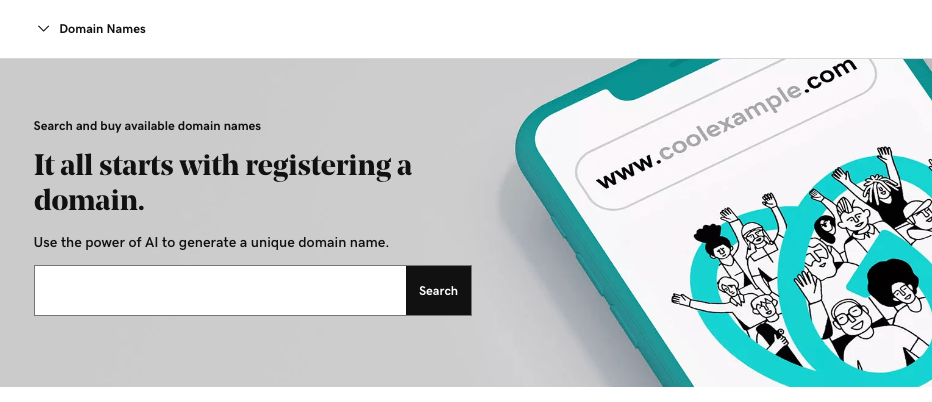
Enter a potential business name and see what pops up. Along with details about availability and cost, you also get information about domain name potential. For example, the domain “Writing.co” is available (as of this writing) and comes with the bonus of being an easy-to-remember English word.
Related: What is a domain name? Definition and examples
What if my first choice isn’t available?
This is where the magic happens. By using GoDaddy's free domain name generator, you'll get a list of other possible domains, some of them even cheaper. This includes those using recently-released extensions (e.g. .com, .net, etc.) such as:
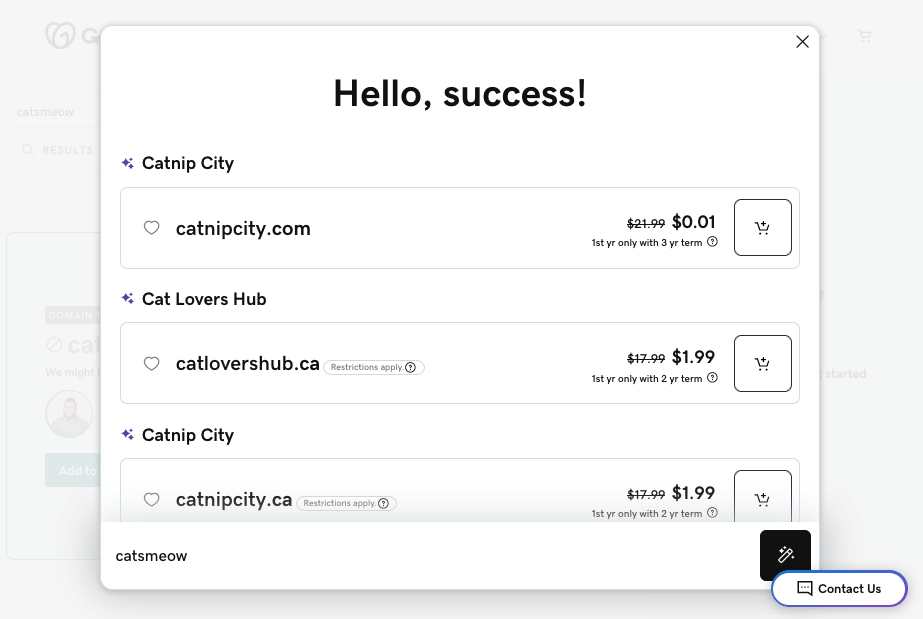
So let’s say you run a plumbing business. Head to GoDaddy’s .plumbing domain lookup page. Type in “pipe” and in seconds you discover that while Pipe.plumbing has already been taken, you could grab:
PipePlumbing.net
Sewer.plumbing
Pipe.contractors
Even if you don’t find the perfect name on your first try, GoDaddy provides a list of similar names and domains to spark inspiration.
Related: The 5 most common domain extensions
Before you register that domain
So you’ve found a great business domain name — and better yet — it helped lock down your new business name. You’re all done, right? Not quite.
Before you register that domain name, do a Canadian Business Name search to make sure no one else had the same bright idea. If another company has trademarked the business name, you won’t be able to register it in Canada. If another business has registered the name to operate in another province, you might be able to use it, but this could be a PR and marketing nightmare if consumers can’t tell your brands apart.
Making it official
Once you find a domain name and memorable business name that hasn’t been claimed by another company, register the business name with the government.
To complete your domain registration with GoDaddy, you’ll need to enter basic information about your business, including contact data. Make sure you provide valid information here, since the Internet Corporation for Assigned Names and Numbers (ICANN) could revoke your domain purchase if you provide false data.
Concerned about privacy? Keep your personal details out of the WhoIs database with private domain name registration.
With private registration, spammers can’t get your email address from the public database.
ICANN requires all domain registrars to publish the contact information for every domain registration. Unfortunately, spammers mine this database for names and emails they can then spam. When you make your registration private, you still own the domain, but the WhoIs database will show the address and phone number of GoDaddy’s privacy affiliate company.
The right name can help you earn trust

Your business name is inherently tied to your brand reputation, online and off. Finding a domain name that matches your business name not only improves consistency (and therefore consumer confidence) but helps you build credibility in the growing internet marketplace. The longer you own your domain name and the stronger its link with your business mission, the better your opportunities for branding — and expanding your company into new markets.
A piece of advice? If you find the perfect business name, trademark it and buy the matching domain in as many extensions as you can. This establishes your business as the primary owner of the name and reduces the chance that you’ll have to buy your own name from another owner at an inflated price when the time comes to expand your business.
What’s in a name? Everything. Find your best-fit branding with GoDaddy’s domain search tool.
Frequently Asked Questions
What is a domain name?
A domain name identifies your site online. Users can type your domain name (aka web address) into the URL bar of their web browser to find your site.
So long as you register and pay for your domain name every year, you’re the only one who gets to use it.
For example, our domain name is godaddy.com. Type that into your URL bar and our website comes up. While our brand name has capital letters — GoDaddy — it doesn’t matter if you use them or not in the domain name. Both will get you where you’re going.
What is a domain name extension?
A domain name extension refers to the part of the domain name that follows the period. In the case of godaddy.com, this means that .com is the extension.
Popular extensions include .com, .net, .org, and in the case of Canada, country-specific extensions such as .ca.
What is a domain name search?
A domain name search checks to see if the domain you want is already taken or not. Using our domain name search tool, simply type in your preferred domain name to see what options are available.
What is a WhoIs request?
The WhoIs database contains information about who owns every domain name on earth. GoDaddy offers a WhoIs look-up service that provides information about who currently owns the domain, when it was registered, and when it expires.
How can I check if a domain name is available?
A domain name search on GoDaddy.com will tell you if a domain name is available, and what it will cost per year to register that domain. Our search tool also provides a list of alternative names if your preferred option is taken.
For example, while the domain name windows.com is taken, windowsnow.net is available, as are windowsystems.com and window.tips.
How do I find out who owns a domain name?
To find out who owns a domain name, do a WHOIS search at the link provided above. WHOIS searches also provide information such as domain registry, expiration dates and when the domain name was first created.
Can I get a domain name that’s already taken?
Yes — if you can convince the current owner to sell you the domain, or if they don’t renew the domain when before the expiry date.
The second method may be easier but rarely happens. In addition, when popular domain names become public again there’s often fierce competition to claim the name, in turn making this an expensive prospect.
If your preferred name is taken, GoDaddy may be able to help you get it. Our expert domain brokers can talk to the owner on your behalf to see if they’re willing to sell you the name — and how much they want to charge.
If the deal is successful and aligns with your budget, the domain is automatically transferred to your account.
Can I get a domain for free?
It’s possible to get a domain for free — or for $0.01 in the case of GoDaddy — as part of a web hosting or domain package. For example, with GoDaddy you can get a domain for just $0.01 for the first year if you opt for a three-year domain name registration.
You can also get a domain name for free with one of our web hosting plans. All hosting packages — Economy, Deluxe, Ultimate, and Maximum — include a free domain name.
Related: What’s the difference between a domain name and hosting?
What is the difference between domain names, web addresses and IP addresses?
Domain names follow the familiar format of name followed by extension, such as godaddy.com.
Web addresses refer to the location of specific pages within the larger domain name. For example, the domain name of this blog post is godaddy.com, while the full web address is:
https://www.godaddy.com/resources/ca/name/need-the-perfect-business-name-start-with-domain-search
Everything after the .com is part of the web address, which tells your browser where to look on our site for that specific content. If we were to delete or move this page, entering the full web address would return an error, since the page would no longer exist.
IP addresses, meanwhile, are sets of numbers in the format 000.000.000.000. Each set of three numbers can be anywhere between 000 and 255, creating 4.3 billion possible combinations. All websites have IP addresses that can be linked to domain names. While these names aren’t technically necessary, they’re much easier for people to remember than their IP alternatives.
Worth noting? Most IP addresses are still based on the standard described above, known as IPv4. The problem? While this method offers 4.3 billion addresses, there are now more than 4.5 billion Internet users worldwide.
As a result, the IPv6 standard was developed — this approach offers 340 trillion, trillion, trillion IP addresses.
What are the different types of domain names?
The different types of domain names available are constantly expanding. When it comes to the name itself, you can select almost any combination of words and phrases so long as it’s available.
Popular extensions include .com, .net, .org, and location-specific extensions such as .ca and .uk.
New extensions are also released regularly — some of the most recent include .app, .baby, and .bargains, with others such as .organic and .music coming soon.
How do I register a domain name?
To register a domain name, first conduct a domain name search and make sure the name you want is available. Use a reputable domain registrar like GoDaddy to ensure it’s properly registered with certificate authorities (CAs) to validate your domain name ownership.
